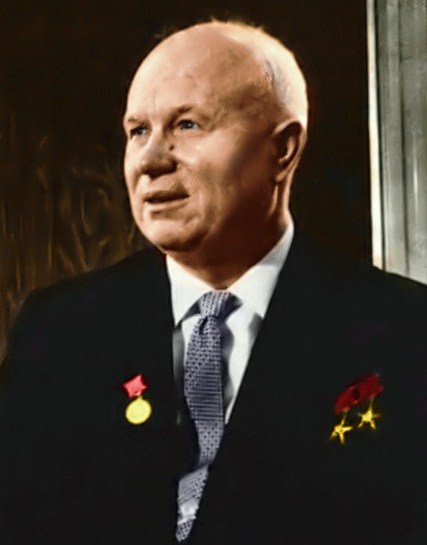Frases célebres de Nikita Jrushchov
“El culto al individuo alcanzó proporciones tan monstruosas debido principalmente a Stalin.”
Fuente: http://www.marxists.org/espanol/khrushchev/1956/febrero25.htm
25 de febrero de 1956, XX Congreso del PCUS.
Sobre Iósif Stalin.
Nikita Jrushchov Frases y Citas
Fuente: http://www.marxists.org/espanol/khrushchev/1956/febrero25.htm
“Lenin nunca impuso por la fuerza sus puntos de vista a sus colaboradores.”
Fuente: http://www.marxists.org/espanol/khrushchev/1956/febrero25.htm
Nikita Jrushchov: Frases en inglés
“Whether you like it or not, history is on our side. We will dig you in. We will bury you.”
Remark to western ambassadors during a diplomatic reception in Moscow (18 November 1956) as quoted in Memoirs of Nikita Khrushchev: Statesman, 1953-1964, Penn State Press, 2007, (2007) by Nikita Sergeevich Khrushchev, p. 893
“Politicians are the same all over. They promise to build a bridge even where there is no river.”
Comment on the construction of a bridge in Belgrade (22 August 1963), quoted in Chicago Tribune (22 August 1963) "Khrushchev Needles Peking"
Disputed
Fuente: Udall, U.S. Rep. Morris K., Khrushchev Could Have Said It, 2016-04-06, originally published in The New Republic, 1962 http://www.library.arizona.edu/exhibits/udall/khrushch_htm.html,
Remark made at Kremlin New Year's Eve reception, December 31, 1956. Quoted in Khrushchev by Edward Crankshaw. ISBN 9781448205059
As quoted in Khrushchev Remembers: The Last Testament (1974)
At a Swedish-Soviet summit which began on March 30, 1956, in Moscow. The stenographed discussion was later published by the Swedish Government.as quoted in Raoul Wallenberg (1985) by Eric Sjöquist, p. 119 ISBN 9153650875
Khrushchev's reply when the Swedish prime minister Erlander assured him that Sweden had no intention of repeating the 1709 Battle of Poltava in eastern Ukraine between Russia and Sweden. From a Swedish-Soviet summit which began on March 30, 1956, in Moscow, as quoted in Raoul Wallenberg (1985) by Eric Sjöquist, p. 125 ISBN 9153650875
“The living will envy the dead.”
The attribution of this widely quoted remark about nuclear war to Khrushchev is disputed in Respectfully Quoted : A Dictionary of Quotations (1989) http://www.bartleby.com/73/1257.html.
In Russia this quote is usually attributed to the translation of Treasure Island by Nikolay Chukovsky: "А те из вас, кто останется в живых, позавидуют мертвым!" ("Those of you who will be still alive will envy the dead", originally: "Them that die'll be the lucky ones"). http://www.chitaem-vmeste.ru/pages/material.php?article=89&
Disputed
No instance of this statement, allegedly in reference to nuclear war, has been found in Khrushchev's writings or documented remarks, as indicated in Respectfully Quoted : A Dictionary of Quotations (1989) http://www.bartleby.com/73/1257.html. Herman Kahn used "the survivors [will] envy the dead" in his 1960 book On Thermonuclear War.
“Mr. President, call the toady of American imperialism to order.”
Remark in the United Nations General Assembly (12 October 1960), denouncing a speech by Philippines delegate Lorenzo Sumulong
Remarks during a Hollywood luncheon (19 September 1959), quoted in New York Times (20 September 1959) "Text of Khrushchev Debate With Skouras"
“If you start throwing hedgehogs under me, I shall throw a couple of porcupines under you.”
As quoted in The New York Times (7 November 1963)
Address to the United Nations, New York City (September 18, 1959), as reported by The New York Times (September 19, 1959), p. 8. The physicist quoted was eventually found to be William Davidon, associate physicist at Argonne National Laboratory, Lemont, Illinois.
“Comrades! We must abolish the cult of the individual decisively, once and for all.”
"The Cult of the Individual and Its Consequences" (24 February 1956), quoted in Lend Me Your Ears (2004) by William Safire
"Secret Report to the 20th Party Congress of the CPSU"
“Berlin is the testicle of the West. When I want the West to scream, I squeeze on Berlin.”
Nikita Khrushchev, First Secretary of the Communist Party of the Soviet Union, Aug. 24, 1963, speech in Yugoslavia[citation needed]
“Are you real men or some goddamned faggots?”
Said to avant-garde artists (Ely Bielutin and Ernst Neizvestny) during a visit to their exhibition (1 December 1962)
Said during a late night visit to a sauna with Finland's president Kekkonen in June 1957. Translated from Våldets århundrade (2001) by Max Jakobson, p. 220 ISBN 9174866389
Impromptu speech at a dinner for visiting East German dignitaries, Moscow (September 17, 1955), as reported by The New York Times (September 18, 1955), p. 19.
“My arms are up to the elbows in blood. That is the most terrible thing that lies in my soul.”
Told to Soviet playwright Nikolay Shatrov, as quoted in William Taubman, Khrushchev: The Man and His Era (New York: W.W. Norton, 2002)
“Stalin originated the concept of 'enemy of the people.'”
This term automatically rendered it unnecessary that the ideological errors of a man or men engaged in a controversy be proven; this term made possible the usage of the most cruel repression, violating all norms of revolutionary legality, against anyone who in any wat disagreed with Stalin, against those who were only suspected of hostile intent, against those who had bad reputations. This concept 'enemy of the people' actually eliminated the possibility of any kind of ideological fight or the making of one's views known on this or that issue, even those of a practical character. In the main, and in actuality, the only proof of guilt used, against all norms of current legal science, was the 'confession' of the accused himself.
"Secret Report to the 20th Party Congress of the CPSU"
Allegedly said shortly before his 1959 visit to the United States. Subsequent investigation by the Library of Congress and the US Information Agency found no source. The Communist Party of the Soviet Union (following Lenin in State and Revolution) considered socialism a necessary transitional stage to communism, and Khrushchev affirmed this position in regard to existing communist-led states, not the United States. See " Khrushchev Could Have Said It http://speccoll.library.arizona.edu/online-exhibits/files/original/809230f1ccf3f96b76341d3a02b6506b.pdf" by Morris K. Udall.
Disputed
Said to avant-garde artists Ely Bielutin and Ernst Neizvestny during a visit to their exhibition (1 December 1962)
